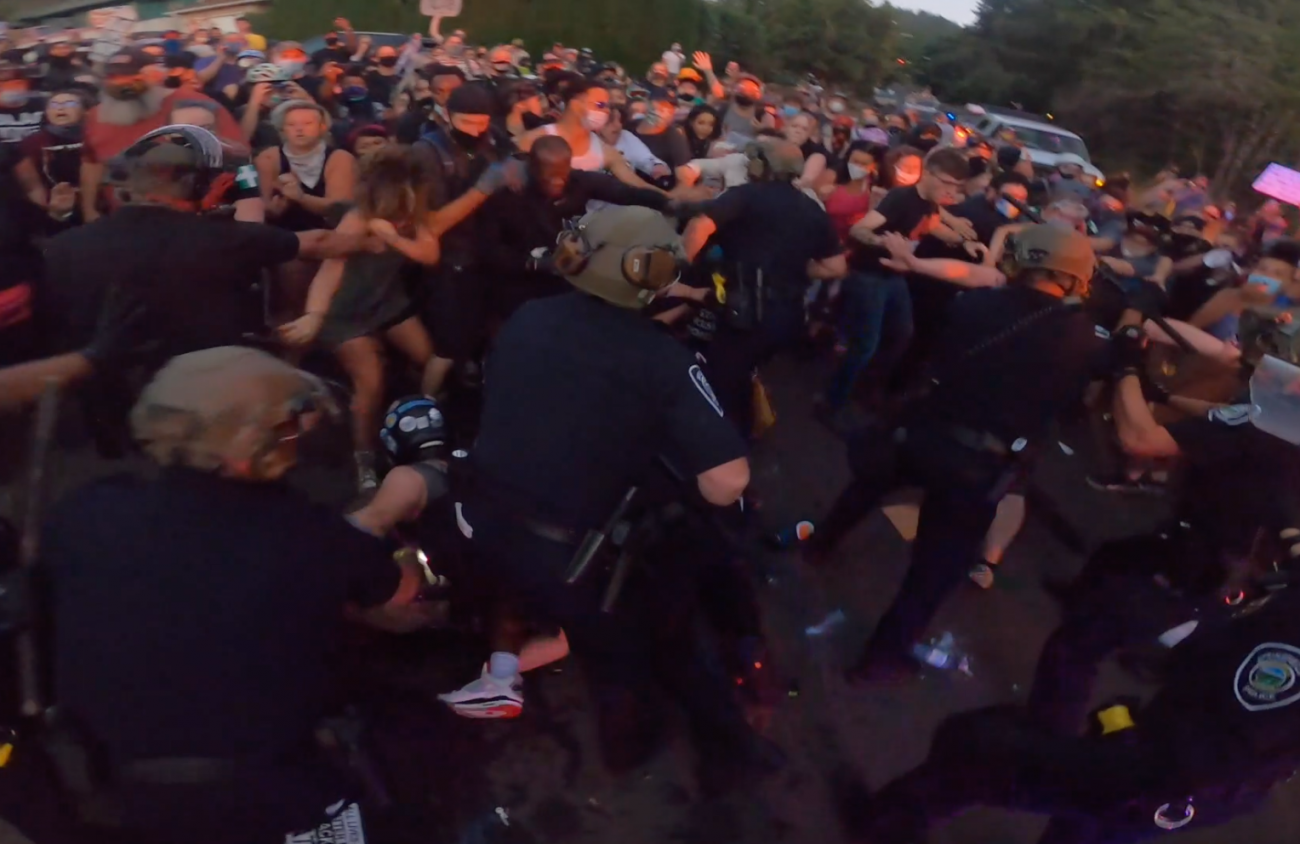Anyone present during the Black Unity-led protest in Springfield’s Thurston Hills neighborhood on July 29, 2020, will likely remember it forever.
The protest focused on supporting a local Black resident and educating people about the racist history of nooses after a neighbor “decorated” his yard with a skeleton on a noose. Dozens of anti-racist protesters showed up in solidarity to march and chant, with some residents joining in. Other neighbors appeared to join with counter-protesters to heckle, harass and assault the protesters.
But it was the responsive police violence, in collusion with racist counter-protesters, that exemplified why people had been continuously protesting nationwide since the May 25 police murder of George Floyd. The Springfield Police Department placed riot cops behind barricades and kettled the marchers, with counter-protesters at the rear of the march and behind the barricade with the cops.
Activists continued to chant, sing and demonstrate at the barricades. SPD rushed them, arresting, jabbing and punching protesters while turning a blind eye to the counter-protesters’ assaults on the nonviolent protesters. Nine activists were charged with misdemeanors, and one faced felonies. Only one was convicted — the other cases were dismissed.
In response to this blatant police misconduct, the Civil Liberties Defense Center (CLDC) represented organizers on criminal charges and filed a federal civil rights lawsuit against the Springfield police to force a reckoning. Two years after the 2020 protest, here is an update on Black Unity, et al., v. City of Springfield, et. al.
The plaintiffs and CLDC recognize that reform is just a Band-Aid on the inherently racist system of policing. Abolition will not come from police departments agreeing to police themselves. However, through increased accountability, we can mitigate the harm people face on a daily basis from outdated, racist and unprofessional policing.
What Are We Pushing For?
CLDC, Black Unity and several individuals filed impact litigation against Springfield, the police and officers in March 2021. In July, we added new defendants and a new plaintiff, Black Unity leader/activist Jazmine Jourdan, who was brutally beaten in the face and head with closed fist “focused blows” — punches and kicks often to the head or face — by Officer Bronson Durrant. Jourdan faced trumped-up charges that were dismissed last month, and now joins the other plaintiffs fighting to dissuade such egregious police misconduct in the future.
Currently, we are in discovery — exchanging documents and taking depositions to gather evidence for trial. What we have learned so far makes us confident about holding SPD accountable for violating activists’ constitutional rights.
Most civil rights cases end in settlement rather than trial. The plaintiffs are attempting to reach an agreement regarding important structural and policy changes within SPD. We provided a list of 12 significant — but reasonable — demands to improve SPD’s transparency, accountability, training, anti-racist and de-escalation policies. So far, the defendants have failed to accept any of these demands or make any meaningful counter-offer, but the plaintiffs remain committed to forging change and anticipate further negotiations this fall.
What has changed at SPD?
Numerous officers, including Chief Richard Lewis and Officer Durrant, have left SPD. The new chief has promised change, but in Oregon, police disciplinary records aren’t public, making it difficult to learn if cops were held to account for violating their duties.
SPD’s misconduct exhausts resources and makes the community less safe. Over the last five years, SPD accounted for 90 percent of the millions of dollars paid out in Lane County police litigation settlements. As part of the $4.55 million settlement with the family of Stacy Kenny, a trans woman brutally killed by SPD during a 2019 traffic stop, an Independent Critical Incident Review recommended 33 policy changes, including disallowing focused blows.
In the aftermath of the Thurston protest, Springfield commissioned another independent assessment. Despite its selective, incomplete review of records, the March 2021 report still made 38 recommendations. Yet, SPD continues to use focused blows, and to our knowledge, has failed to adopt any recommendations other than those mandated by new state laws.
Last month, the Eugene Police Department brought in the SPD riot squad to break up a reproductive justice protest after the Supreme Court overturned Roe v. Wade. Once again, people were subjected to excessive force and injury by over-reactive, militarized cops.
Endless Pressure, Endlessly Applied
Oregon has a long history of racism, and these racist roots are often evident in Oregon’s police departments today. That’s part of why CLDC is working with Black Unity and the larger BIPOC community to bring about real change in a department that has long resisted it.
Many more people were affected and injured on that day than are included in our lawsuit. Not everyone can join such a suit due to its immense pressure on their time, family and mental health, as they are placed under scrutiny in their pursuit of justice. With this litigation, Black Unity and CLDC seek a future Springfield in which BIPOC can assert their rights without fear of state-sanctioned violence.
Long-range litigation like this is most effective with sustained community engagement, without which SPD and the city may feel less urgency to address their internal problems. Even as Springfield faces the threat of losing its insurance because of SPD misconduct, it continues to resist the call for drastic reform.
The Civil Liberties Defense Center is a nonprofit organization of lawyers and movement professionals who seek to dismantle the political and economic structures at the root of social inequality and environmental destruction. We provide litigation, education, legal and strategic resources to strengthen and embolden environmental and social justice movement success. Learn more and get involved at cldc.org.
